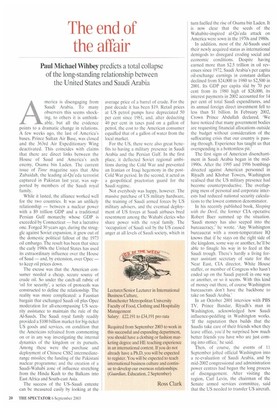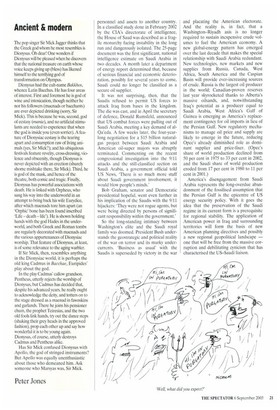The end of the affair
Paul Michael Wihbey predicts a total collapse of the long-standing relationship between the United States and Saudi Arabia America is disengaging from Saudi Arabia. To many observers this seems shocking, to others it is unthinkable, but all the evidence points to a dramatic change in relations. A few weeks ago, the last of America's bases, Prince Sultan Air Base, was closed and the 363rd Air Expeditionary Wing deactivated. This coincides with claims that there are direct links between the House of Saud and America's arch enemy, Osama bin Laden. The current issue of Time magazine says that Abu Zubaidah, the leading al-Qa'eda terrorist captured in Pakistan last year, was supported by members of the Saudi royal family.
While it lasted, the alliance worked well for the two countries. It was an unlikely relationship — between a nuclear power with a $9 trillion GDP and a traditional Persian Gulf monarchy whose GDP is exceeded by Connecticut but a lucrative one. Forged 30 years ago, during the struggle against Soviet expansion, it grew out of the domestic political fallout of the 1973 oil embargo. The result has been that since the early 1980s the United States has used its extraordinary influence over the House of Saud — and, by extension, over Opec — to keep oil prices down.
The excuse was that the American consumer needed a cheap, secure source of crude oil. So under the catch-all rubric of 'oil for security', a series of protocols was constructed to define the relationship. The reality was more complicated: a Faustian bargain that exchanged Saudi oil plus Opec moderation for all-encompassing US security assistance to maintain the rule of the Al-Sauds. The Saudi royal family readily provided a $100 billion market for big-ticket US goods and services, on condition that the Americans refrained from commenting on or in any way investigating the internal dynamics of the kingdom or its pursuits. Among these were the purchase and deployment of Chinese CSS2 intermediaterange missiles; the funding of the Pakistani nuclear programme; and the creation of a Saudi-Wahabi zone of influence stretching from the Hindu Kush to the Balkans into East Africa and South-east Asia.
The success of the US-Saudi entente can be measured easily by looking at the average price of a barrel of crude. For the past decade it has been $19. Retail prices at US petrol pumps have depreciated 50 per cent since 1981, and, after deducting 40 per cent in taxes paid on a gallon of petrol, the cost to the American consumer equalled that of a gallon of water from the local market.
For the US, there were also great benefits to having a military presence in Saudi Arabia and the Persian Gulf. In the first place, it deflected Soviet regional ambitions during the Cold War and prevented an Iranian or Iraqi hegemony in the postCold War period. In the second, it acted as a geopolitical praetorian guard for the Saudi regime.
Not everybody was happy, however. The massive purchase of US military hardware, the training of Saudi armed forces by US military advisers, and the eventual deployment of US forces at Saudi airbases bred resentment among the Wahabi clerics who share power with the royal family. The 'occupation' of Saudi soil by the US caused anger at all levels of Saudi society, which in
turn fuelled the rise of Osama bin Laden. It is now clear that the seeds of the Wahabite-inspired al-Qa'eda attack on America were sown in the 1970s and 1980s.
In addition, most of the Al-Sauds used their newly acquired status as international demigods to disregard eroding social and economic conditions. Despite having earned more than $2.5 trillion in oil revenues since 1972, Saudi Arabia's per capita oil-exchange earnings in constant dollars declined from $24,000 in 1980 to $2,500 in 2001. Its GDP per capita slid by 70 per cent from its 1980 high of $28,000, its interest payments in 2002 accounted for 14 per cent of total Saudi expenditures, and its annual foreign direct investment fell to less than $1 billion. In February 2002, Crown Prince Abdullah declared, 'We have noticed that many government bodies are requesting financial allocations outside the budget without consideration of the suffocating crisis that our country is passing through. Experience has taught us that overspending is a bottomless pit.'
The first signs of American disenchantment in Saudi Arabia began in the mid1990s. After the 1995 and 1996 bombings directed against American personnel in Riyadh and Khobar Towers, Washington realised that the US military presence had become counterproductive. The overlapping mess of personal and corporate interests had reduced national security calculations to the lowest common denominator.
In his recently published book, Sleeping with the Devil, the former CIA operative Robert Baer summed up the situation. 'Saudi money has also seeped into the bureaucracy,' he wrote. 'Any Washington bureaucrat with a room-temperature IQ knows that if he stays on the right side of the kingdom, some way or another, he'll be able to finagle his way in to feed at the Saudi trough. There's hardly a living former assistant secretary of state for the Near East, CIA director, White House staffer, or member of Congress who hasn't ended up on the Saudi payroll in one way or another, or so it seems. With this kind of money out there, of course Washington bureaucrats don't have the backbone to take on Saudi Arabia.'
In an October 2001 interview with PBS TV, Prince Bandar, Riyadh's man in Washington, acknowledged how Saudi influence-peddling in Washington works. *If the reputation then builds that the Saudis take care of their friends when they leave office, you'd be surprised how much better friends you have who are just coming into office,' he said.
Then, of course, the events of 11 September jolted official Washington into a re-evaluation of Saudi Arabia, and by mid-2002 congressional and administration power centres had begun the long process of disengagement. After visiting the region, Carl Levin, the chairman of the Senate armed services committee, said that the US needed to transfer US aircraft, personnel and assets to another country. In a classified study done in February 2002 by the CIA's directorate of intelligence, the House of Saud was described as a fragile monarchy facing instability in the long run and dangerously isolated. The 25-page document was the first significant, national intelligence estimate on Saudi Arabia in two decades. A month later a department of energy report determined that, because of serious financial and economic deterioration, possibly for several years to come, Saudi could no longer be classified as a secure oil supplier.
It was not surprising, then, that the Saudis refused to permit US forces to attack Iraq from bases in the kingdom. The die was cast, and in April the secretary of defence, Donald Rumsfeld, announced that US combat forces were pulling out of Saudi Arabia, meeting a key demand of alQa'eda. A few weeks later, the four-yearlong negotiation for a $15 billion naturalgas project between Saudi Arabia and American oil-super majors was abruptly terminated. Commenting on the recent congressional investigation into the 9/11 attacks and the still-classified section on Saudi Arabia, a government official told US News, 'There is so much more stuff about Saudi government involvement, it would blow people's minds.'
Bob Graham, senator and Democratic presidential hopeful, went even further in his implication of the Saudis with the 9/11 hijackers: They were not rogue agents, but were being directed by persons of significant responsibility within the government.'
So the long-standing intimacy between Washington's elite and the Saudi royal family was doomed. President Bush understands the geostrategic and political reality of the war on terror and its murky undercurrents. 'Business as usual' with the Saudis is superseded by victory in the war and placating the American electorate. And the reality is, in fact, that a Washington-Riyadh axis is no longer required to sustain inexpensive crude volumes to fuel the American economy. A new global-energy pattern has emerged over the last decade that makes the special relationship with Saudi Arabia redundant. New technologies, new markets and new supplies from Russia, Canada, West Africa, South America and the Caspian Basin will provide ever-increasing sources of crude. Russia is the largest oil producer in the world; Canadian-proven reserves last year skyrocketed thanks to Alberta's massive oilsands, and, notwithstanding Iraq's potential as a producer equal to Saudi Arabia, West Africa's Gulf of Guinea is emerging as America's replacement contingency for oil imports in lieu of the Persian Gulf. New regulatory mechanisms to manage oil price and supply are likely to emerge in the future, reducing Opec's already diminished role as dominant supplier and price-fixer. (Opec's share of world production declined from 50 per cent in 1975 to 33 per cent in 2002, and the Saudi share of world production eroded from 17 per cent in 1980 to 11 per cent in 2001.) America's disengagement from Saudi Arabia represents the long-overdue abandonment of the fossilised assumption that the Persian Gulf is the epicentre of US energy security policy. With it goes the idea that the preservation of the Saudi regime in its current form is a prerequisite for regional stability. The application of American power in Iraq and surrounding territories will form the basis of new American planning directives and possibly a new regional geopolitical landscape — one that will be free from the massive corruption and debilitating cynicism that has characterised the US-Saudi liaison.











































































 Previous page
Previous page